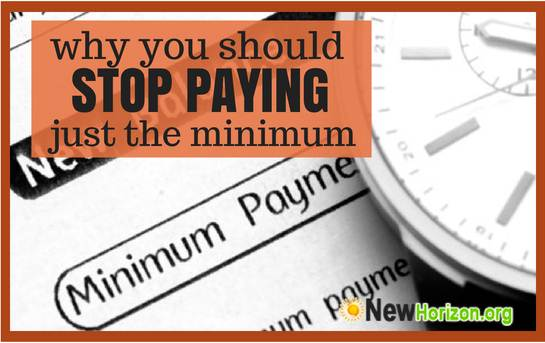Home » Blog » Why You Should Never Pay Just the Minimum Amount Required by Your Card Issuer
78 Views0

Stop Paying the Minimum Credit Card Payment

To find out the reasons why finance experts discourage you from paying just the minimum credit card payment amount required by your credit card, let’s consider the disadvantages of carrying a balance from one month to the next.
First, let’s define what the minimum payment is.
Minimum Payment Amount Defined
This is the smallest amount you can pay each month to keep your account in good standing. It’s usually a percentage of your outstanding balance, typically around 1-3%, plus any interest and fees.
The Problem With Just Making The Minimum Credit Card Payment
The problem with paying only the minimum amount is that it can take years, even decades, to pay off your debt. This is because most of your payment is going towards interest, not the actual balance. In fact, the interest can add up to more than the original debt over time.
For example, let’s say you have a credit card balance of $5,000 with an interest rate of 18%. If you only pay the minimum payment of 2% each month, it will take you over 19 years to pay off the debt, and you’ll end up paying over $9,500 in interest alone.
If you’re only making the minimum payment, most of your payment will go towards paying off the interest charges, not the principal amount you owe. This means that it will take much longer to pay off your debt and you’ll end up paying much more in interest charges over time.
Pay More Than The Minimum Credit Card Payment To Avoid Damaging Your Credit Score

Your credit utilization ratio is an important factor that determines your credit score. This ratio compares your credit card balances to your credit limit. If you’re only making the minimum payment, your balance will remain high, which will increase your credit utilization ratio. A high credit utilization ratio can lower your credit score and make it harder for you to obtain credit in the future.
Increased Debt Load If You Pay Only The Minimum Credit Card Payment
When you only make the minimum payment on your credit card, you’re not really paying off your debt. Instead, you’re just keeping up with the interest charges. This means that your debt will continue to grow over time, making it harder and harder to pay off. If you continue to make only the minimum payment, you could end up with a lot of debt that’s difficult to manage.
Credit Score Improvement Tips
Here are some suggestions to help you get out of debt and increase your credit score:

Some people will set up bill pay to make the minimum payment, and then later on they will make an extra payment at the end of the month with any extra funds they have.
This will help you pay off the debt faster and save you money on interest. If you have multiple credit card debts, consider focusing on paying off the one with the highest interest rate first.
Transfer your balance to a credit card with a lower interest rate or a balance transfer offer. This can help you save money on interest and pay off the debt faster, but make sure to read the terms and conditions carefully to avoid any fees or surprises.
In conclusion, paying only the minimum credit card payment is a bad idea because of the high-interest rates, long repayment periods, lower credit scores, and increased debt.
If you’re struggling to pay off your credit card debt, it’s important to come up with a plan to pay off your debt as quickly as possible. This might mean cutting back on your spending, finding ways to earn more money, or seeking the help of a credit counseling agency. By taking control of your debt and making more than the minimum payment, you can improve your financial situation and reduce your debt over time.
